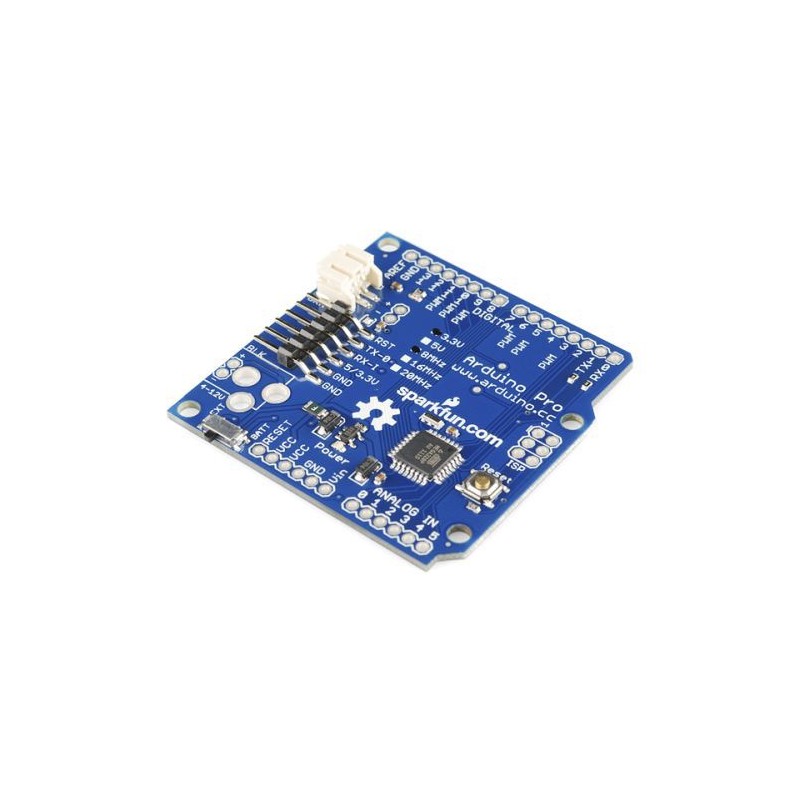



zł76.34 tax excl.
SparkFun DEV-10914 is a compact development board with an ATmega328 and 3.3 V logic level, equipped with basic protection and designed to work with an external USB–UART interface. It is suitable for applications requiring cooperation with low-voltage modules.
Development board with an ATmega328 microcontroller clocked at 8 MHz, adapted for operation with a 3.3 V logic level. The design enables cooperation with modules and shields requiring low-voltage signals. To reduce costs, no pre-soldered connectors or power socket have been used, but mounting pads are provided to allow their addition. Programming is possible via an external USB–UART converter connected to pins in the standard pin layout. The board features reverse polarity protection and a fuse protecting against short-circuit effects, as well as a power source selection switch.
Data sheet
Manufacturer BTC Korporacja sp. z o. o. Lwowska 5 05-120 Legionowo Poland sprzedaz@kamami.pl 22 767 36 20
Responsible person BTC Korporacja sp. z o. o. Lwowska 5 05-120 Legionowo Poland sprzedaz@kamami.pl 22 767 36 20
Base board compatible with Arduino. It was equipped with the ATSAMD21G18 microcontroller. It has 26 I/O lines and 14 analog inputs. SparkFun DEV-14812
No product available!
A small module, matching the breadboard, containing a 32-bit microcontroller with ARM Cortex M7 core. PJRC TEENSY40
Evaluation kit with Sparkfun Artemis Bluetooth 5.0 module designed on the basis of the Arduino UNO kit. It has a USB C. The board also has a USB-UART converter, a microphone and a JTAG debugging connector. Artemis has support in the Arduino IDE. SparkFun DEV-15444
Evaluation kit with Sparkfun Artemis Bluetooth 5.0 module designed on the basis of the Arduino Nano kit. It has a USB C. The board also has a USB-UART converter, a microphone, Lipo battery charging and a JTAG debugging connector. Artemis has support in the Arduino IDE. SparkFun DEV-15443
Evaluation kit with Sparkfun Artemis Bluetooth 5.0 module designed on the basis of the Feather kit. It has a USB C. The board also has a USB-UART converter, a microphone and a JTAG debugging connector. Artemis has support in the Arduino IDE. SparkFun WRL-15574
Evaluation kit with Sparkfun Artemis Bluetooth 5.0 module designed on the basis of the Arduino Mega kit. It has a USB C. The board also has a USB-UART converter, a microphone and a JTAG debugging connector. Artemis has support in the Arduino IDE. SparkFun DEV-15442
Pro Micro is similar to Pro Mini Arduino compatible board, main difference is that Pro Micro uses ATmega32u4 with builtin USB connectivity. Sparkfun DEV – 12587
No product available!
A small module matching the contact plate based on a 32-bit microcontroller with ARM Cortex M7 core. Has a microSD slot. PJRC TEENSY41
Board with the ATmega328 microcontroller from the AVR family, there are 20 I/O lines, 6 PWM channels, 6 analog inputs at the user\'s disposal. SparkFun DEV-15123
Development kit with ATSAMD21E microcontroller with ARM Cortex M0+ core. The chip can be clocked at 48 MHz, has a built-in 256 KB of Flash memory and 32 KB of SRAM. The module has a Qwiic connector. SparkFun DEV-15423
Development kit with SAMD21G18A microcontroller with ARM Cortex M0+ core and LoRa RFM95W radio communication module. SparkFun WRL-15836
Development kit with ATSAMD51J20 microcontroller with ARM Cortex M4F core. It is clocked at 120 MHz, has 1 MB of Flash and 256 KB of SRAM. There are 6 SERCOM interfaces on the board. SparkFun DEV-14713
Evaluation kit with Bluetooth 5.0 Sparkfun Artemis module. Equipped with a microphone, kmaers and accelerometer. SparkFun DEV-16828
Evaluation kit with Bluetooth 5.0 Sparkfun Artemis module. Equipped with a microphone, kmaers and accelerometer. Himax HM01B0 camera included. SparkFun KIT-17071
Development board equipped with ATSAMD21G18 microcontroller. It has 30 I/O lines, including SERCOM interfaces and 14 analog inputs. Compatible with Arduino. SparkFun DEV-13672
Base board compatible with Arduino. It was equipped with an ATmega328P microcontroller. It has 22 I / O lines (including 6 PWM channels) and 8 analog inputs and a Qwiic connector. SparkFun DEV-18158

SparkFun DEV-10914 is a compact development board with an ATmega328 and 3.3 V logic level, equipped with basic protection and designed to work with an external USB–UART interface. It is suitable for applications requiring cooperation with low-voltage modules.
